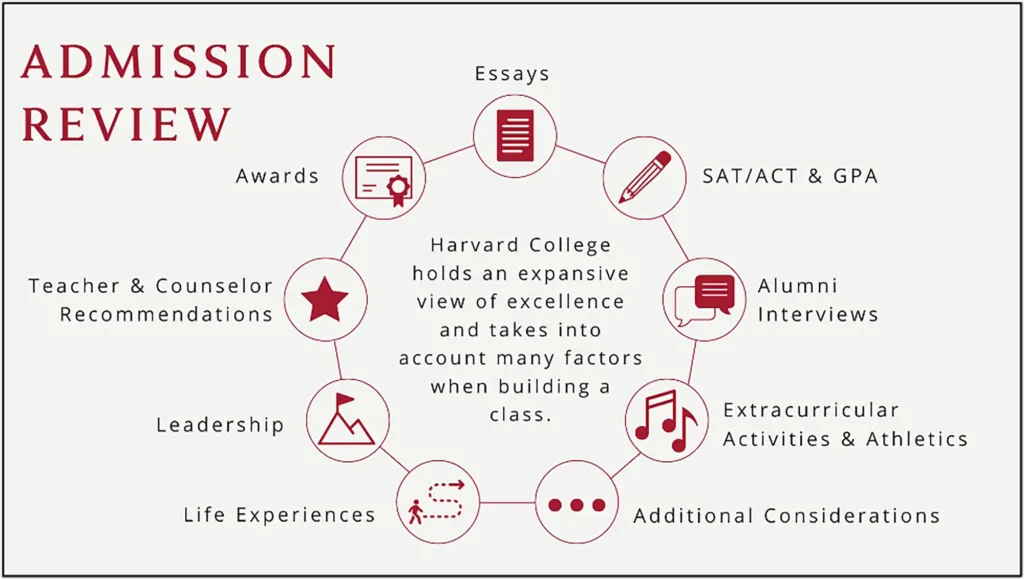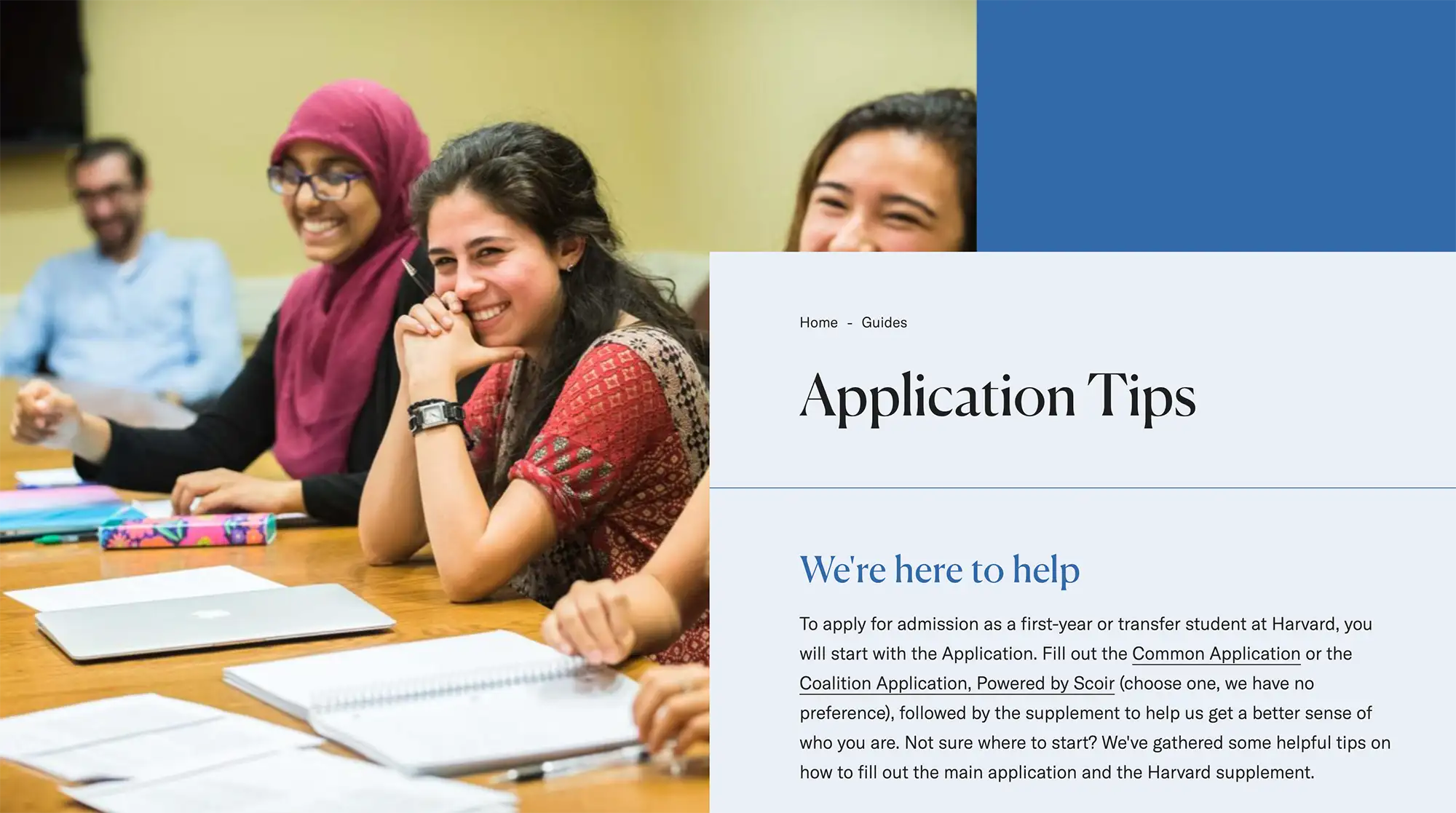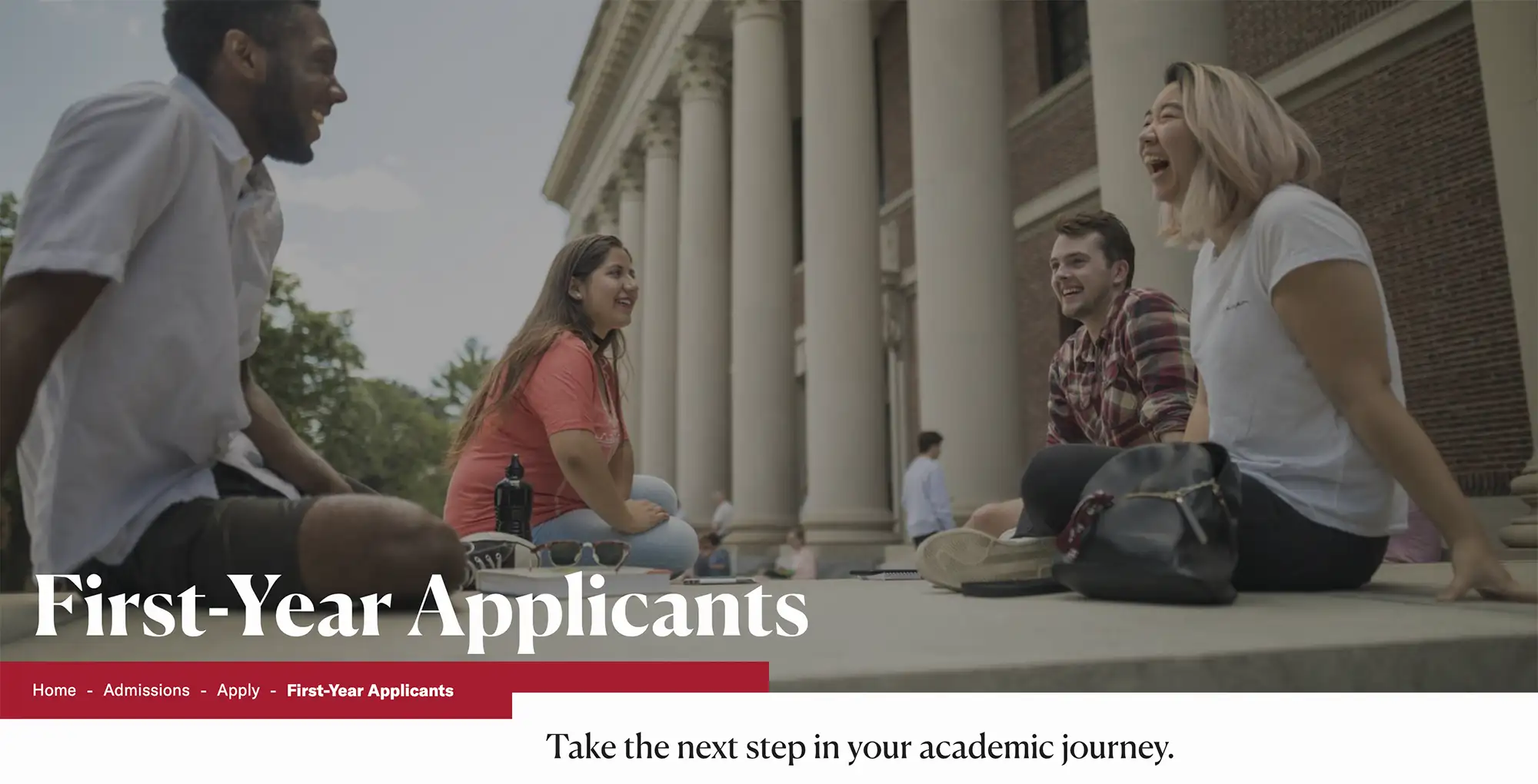Harvard Outreach Newsletter
146th Issue, October 2025
In this issue:
- USA College Day, 26/27 September
- Harvard College application requirements 2025/26
- Harvard Admissions Office 'whole person review'
- What's the difference between 'Early Action' and 'Regular Action' when applying to US colleges?
- What should I be doing now if I am applying to US colleges next year?
- Athletic applications at Ivy League colleges
USA College Day, 26/27 September
USA College Day, organised by the US-UK Fulbright Commission, is the largest US college fair in the UK, and took place at the Kensington Conference and Event Centre, London, on Friday and Saturday, 26/27 September.
This year, instead of having a table in the main exhibition area, the Harvard Club of the UK showed a 10-minute video every half hour in the Council Chamber adjacent to the Exhibition Hall. The video provided the answers to the six most frequently asked questions at the Harvard stand in previous years. It was followed by 10 minutes of questions from the audience, which were answered by a panel including recent graduates from Harvard College. In addition to the six FAQs answered in the video, audience members asked a further 82 questions. The total attendance across all sessions was 430.
The new format was a great success and proved to be a very effective way of disseminating information to large numbers of visitors. Not only were the panel able to answer more questions from more people than in previous years, but also there was more time for audience members to visit the stands of other colleges in the main conference area.
A massive thank you to the Harvard Club’s alumni volunteers who made up the panels in different sessions over the two days: Yousuf Bakshi, Yuko Thomas, Monica Mendiratta, Molly Nolan, and Katharina Lix. Thanks also to our photographer, Kate Cooper.
Harvard College application requirements 2025/26
The information in the following paragraphs is for students in the final year of secondary school or sixth form college who will be submitting applications to Harvard College this autumn for the graduating class of 2030 (starting in August 2026):
- Year 13 (England and Wales)
- S6 (Scotland)
- Year 14 (Northern Ireland)
Exam grades. Harvard accepts all UK public examinations equally – it doesn’t matter which you take, as long as the grades are good. Typical grades of applicants admitted to Harvard are:
- GCSE: Grades 7-9 (numbered system), or A/A* (lettered system)
- Scottish National 5s: Grades A/B
- AS levels (where taken): Grades A/B
- A Levels: Grades A/A*
- Scottish Highers and Advanced Highers: Grades A/B
- International Baccalaureate (IB): Grades 39-45
But don’t forget that the Admissions Office undertakes a ‘whole person review’ of every candidate (see next section), so students who have the odd grade lower than those stated above may be granted admission if they have significant achievement elsewhere in their application, such as for an extracurricular activity or outstanding potential contributions to the Harvard community.
Harvard Admissions Office 'whole person review'
Candidates for Harvard will be assessed using what is called a ‘whole person review,’ which means that the Admissions Committee considers many factors when building a class.

The ‘whole person review’ includes:
- Academic achievement: academic considerations (grades, scores, teacher comments) are the most important, but other qualities help differentiate among exceptional candidates (examples in Admission Review diagram).
- Extracurricular profile: activities and achievements outside of academic study, in any field.
- Contributions to community: family responsibilities, potential contribution to the Harvard community and to the education of those around you, interest in your academic field of choice, initiative, leadership potential, open mindedness, enthusiasm.
The goal is to obtain the fullest possible picture of the applicant – both past accomplishments and future potential. Admission is less a reward for what a student has done in the past than a belief and an investment in what he or she will do in the future.
Other elements of the Whole Person Review
Standardized test scores. Harvard College will require the submission of standardized test scores from applicants for admission as part of the comprehensive application process that takes a whole-student approach. The Application Requirements page of the Harvard Admissions website states that:
“SAT and ACT tests are better predictors of Harvard grades than high school grades. However, admission officers understand that not all students attend well-resourced schools throughout their lives, and that those who come from modest economic backgrounds or first-generation college families may have had fewer opportunities to prepare for standardized tests.
“Given the wide variation in how students prepare for Harvard – as well as the fact that most applicants and admitted students have outstanding academic records – it is difficult for high school grades to differentiate individual applications. That does not mean that high school grades are unimportant. Students who come to Harvard have done well day to day in their high school studies, providing a crucial foundation for academic success in college, including a 97% – 98% graduation rate.
“Each application to Harvard is read with great care, keeping in mind that talent is everywhere, but opportunity and access are not.”
School reports and teacher recommendations. As you will be submitting your application before you have taken your A Levels, Scottish Advanced Highers or IB exams, your school should provide your predicted grades in your School Transcript and submit the actual grades as soon as they are released in July or August. School Transcript templates may be downloaded from the ‘Applying for an undergraduate degree‘ page on the Fulbright Commission website. Scroll down the page until you reach ‘School Documents’ and then down a bit further to ‘Transcript.’ Then download the appropriate template for the type of exam you are taking.
Applicants must ask two teachers in different academic subjects who know them well to complete the Teacher Evaluation forms – these are in addition to the character reference supplied by your Head of Sixth Form or teacher in charge of university applications. In your application confirmation email, there will be a personalised link to send to your recommenders (referees).
Supplementary materials. At the discretion of the Admissions Committee, supplementary materials – such as music recordings, artwork, or selected samples of academic work – may be evaluated by faculty. These materials are entirely optional. Scholarly articles, research, creative writing or other documents of which you are the primary author should be submitted in the ‘Upload Materials’ section of the applicant portal. You may submit optional supplementary media materials (e.g. videos, audio recordings, or images) electronically via Slideroom.
Extracurricular activity. The Admissions Committee takes a broad view of extracurricular activity (or ‘enrichment activities’ as they are often called in the UK). It might be that you are exceptionally good at music, sport, acting, dancing, art or writing; or it might be something different such as starting a blog about a subject that interests you, setting up a special interest group on the web, starting up a new club or society, looking after a sick relative, or helping your local community in some way.
Interviews. Some candidates will receive an informal alumni interview in the UK if the Admissions Committee would like more information about them or has questions about their admissions materials. This can be undertaken in person or remotely by Zoom, WhatsApp or phone. However, your application is deemed complete without an interview and will receive a full and thorough evaluation regardless – the absence of an interview will not disadvantage your application.
Application forms. Harvard College accepts the Common Application or the Coalition Application – it doesn’t matter which you use. If using the Common App, note that you must submit your own sections of the application before your supporting materials (Secondary School Report, Teacher Reports etc.) will be transmitted to the Harvard Admissions Office. Be sure to study the Application Tips on the Harvard Admissions website.
What's the difference between ‘Early Action’ and ‘Regular Action’ when applying to US colleges?
If you are applying this year for entry to the Class of 2030 you should now be putting together the components of your application ready to submit to your chosen colleges by the Early Action or Regular Action deadline.
‘Regular Action’ refers to the normal deadline for submitting your application to American colleges (1st January at Harvard, but it does vary from college to college). You may apply to as many colleges as you like by this deadline. But if you have one particular institution that is your clear favourite, many American colleges provide an option called ‘Restrictive Early Action,’ or just ‘Early Action,’ which allows you to apply to one US college earlier than the others (by 1st November at Harvard) and receive a decision by mid-December. (Note that you can still apply to UK universities if you are applying Early Action in the US). For many competitive US colleges, there is no advantage or disadvantage in applying Early or Regular Action, but some colleges may see your early application as an indication that they are your top choice, and may feel more favourable towards your application for that reason. Check each college’s website to see if they make any statements about possible advantages in the process for submitting an early application.
Some colleges use the term ‘Early Decision’ rather than ‘Early Action’. What’s the difference?
If you apply to a college ‘Early Action’ and are offered a place, the offer is not binding and you may wait and see if you get further offers from your ‘Regular Action’ colleges or UK universities before you decide which offer to accept. On the other hand, an offer made as a result of an ‘Early Decision’ application is binding, so you must accept the offer and withdraw your applications from all other colleges to which you have applied. This is not a problem if you definitely want to go the ‘Early Decision’ college, but being offered admission will close off all other options so it is very important to check whether an offer will be binding or non-binding before submitting your application. There is, however, one advantage to applying to an ‘Early Decision’ college: you have a greater chance of being admitted because the Admissions Office knows you are already fully committed to attending if you are offered a place.
More information about Restrictive Early Action can be found on the First-Year Applicants page of the Harvard Admissions website.
What should I be doing now if I am applying to US colleges next year?
The information below is for students in the penultimate year of secondary school or sixth form college:
- Year 12 (England and Wales)
- S5 (Scotland)
- Year 13 (Northern Ireland)
The most essential thing to do, this year and every year, is to work hard throughout the year to get good grades and/or teacher assessments for all your academic work.
Other than that, the two essential tasks for applying to American colleges are to research the college system, and to register for next year’s standardized tests if you choose to take them. (They are now compulsory at Harvard, but are still optional at most other US colleges).
- Research the US college system. Use one of the specialist search engines to research the college system and identify a long list, and then a short list, of colleges to which you might like to apply. There are a number of search engines you can try, including Peterson’s and the College Board
- Register to take the standardized admissions tests, if required, and book a place far enough ahead to allow you plenty of time to practise. If you haven’t already done so, register for the tests now and book a date or dates to take them in the spring of 2026. You might want to set aside two or three hours’ practice time each week for the next few months so you are at your peak performance by the time you sit the exams. Those US colleges that require standardized tests have no preference between the SAT and the ACT, but the two tests are structured differently, so the one you decide to take will simply boil down to the style of exam you prefer. A good method of deciding is to take a free online test in both the SAT and the ACT and go with whichever one gives you the better score.
Here are some links to the free online practice material:
For the SAT, free digital online practice tests are also provided by the Khan Academy.
For the ACT, free online practice tests are also provided by Kaplan.
If you need additional practice material, hard copy and digital SAT and ACT practice tests are available from online publishers for around £23 – £25.
Athletic applications at Ivy League colleges
The Ivy League is an athletic conference formally established in 1954, and is made up of eight universities in the eastern United States: Brown, Columbia, Cornell, Dartmouth, Harvard, Pennsylvania, Princeton, and Yale. The term is often used to refer to the universities themselves, but strictly speaking, it is an athletic league where the eight colleges play each other in a variety of different sports.
Commenting on its foundation, the Ivy League website states:
“…one of its defining principles was a commitment to access and opportunity exemplified by need-based financial aid. Another was that its recruited athletes be academically representative of each institution’s overall student body.”
In Harvard’s case, this means that all admitted students – whether they are athletic recruits or not – automatically get access to financial aid if they need it, and the amount they receive is means-tested against their family’s income and assets. It also means that athletic recruits go through the through the same ‘whole person review’ (see above) as other applicants, and have to be able to offer both academic excellence and significant achievement outside the classroom in their applications.
Student athletes must be of a very high calibre. The rule of thumb is that they need to be playing their sport at a national, rather than regional, level. High-calibre candidates are encouraged to contact the head coach of their sport (details on the college websites) with details of their athletic achievements, and to ask the coach directly about the level of interest in them as potential athletic recruits. The coach might then invite some candidates for a trial, and may decide to support some of the applications. However, only the Admissions Office at each Ivy League school has the authority to admit an applicant and to notify the applicant of admission.
Under certain circumstances, the Admissions Office may issue a letter prior to the official admissions decision indicating that a candidate is ‘likely’ to be admitted. This means that, as long as the applicant sustains the academic and personal record reflected in the completed application, the institution will send a formal admission offer on the appropriate notification date.
International athletic applicants are treated in exactly the same way as US citizens, both in terms of recruitment, admission, and financial aid.
For further details, see the Ivy League website.

If you enjoyed reading this newsletter and wish to receive future newsletters, click here to subscribe.


